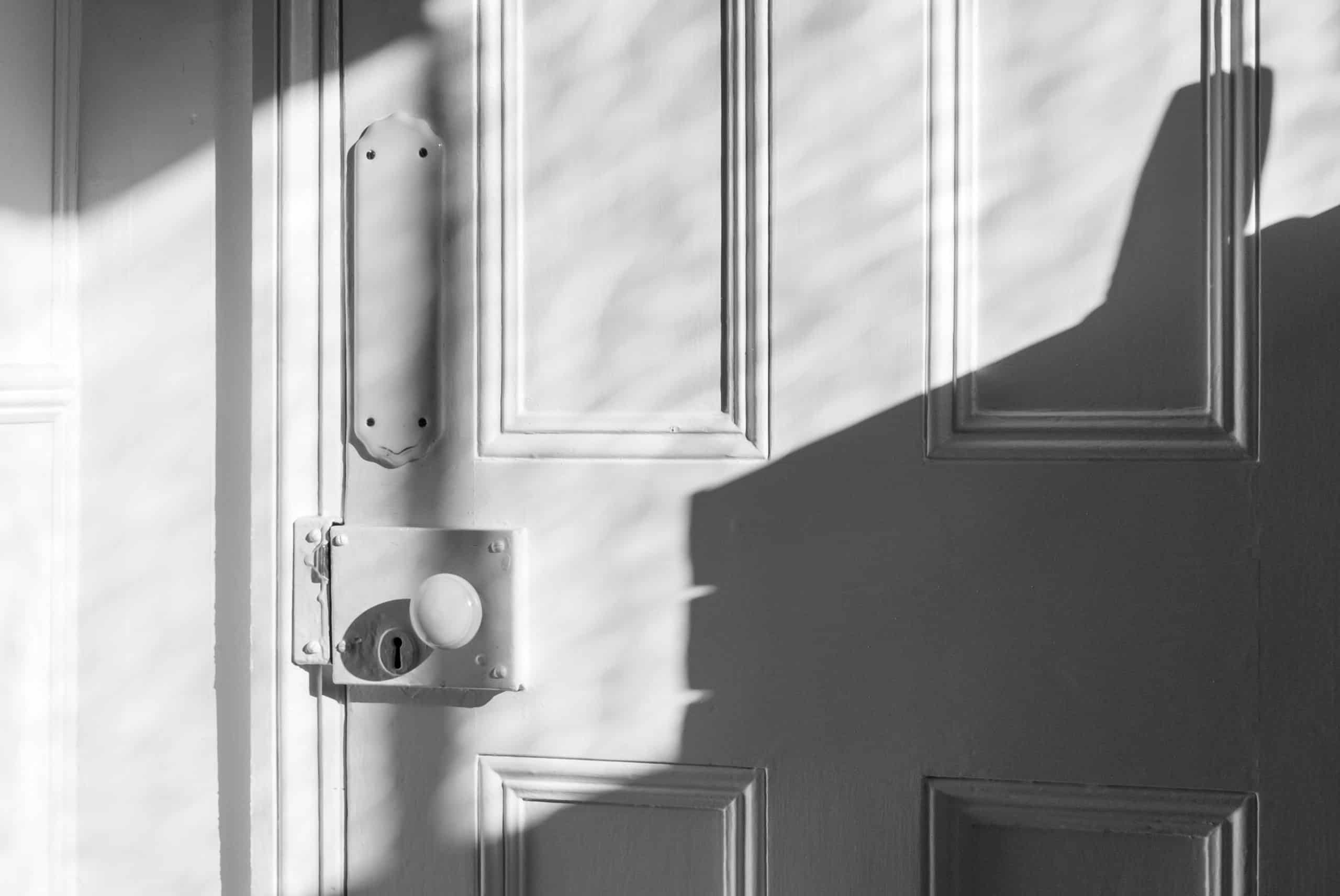This is the fifth installment of A Deacon’s Diary. In the fourth installment, Steve tried to answer a perennial question.
I.
For the past few weeks, I’ve had a repetitive dream. The only part of it I remember is the sound of someone knocking on my door, which always brings me into waking consciousness. Abruptly. It’s happened three or four times in about as many weeks. Sometimes it’s in the middle of the night. Sometimes (on the rare day when I have the opportunity) it has terminated an afternoon nap.
Each time, I wake up a bit startled and I get up and check the door of my room.
Each (and every) time the hallway is thoroughly empty. Not even the other Jesuits who live in this part of the house are around (or awake). Dust sits undisturbed on the books for my licentiate thesis that have taken up residence in the hallway next to my door.
II.
Here in Boston, it gets dark early and it’s getting colder. There isn’t even the reflected light that a new blanket of snow brings with it—icy, but luminous. Some weeks remain before the natural world shifts and it begins to stay lighter for a bit longer. So December goes. The apocalyptic tone of some of the readings for Mass lately has lent itself to a certain quiet, a certain waiting, and certain darkening.
The state of the world sometimes seems to cooperate with the lectionary cycle. Another strain of the pandemic virus. The world remains a less than just and harmonious place. Racism and ecological crisis seem to be proof of this.
When I’m at the pulpit in Boston University’s Marsh Chapel, I preach about the need for love, the need for conversion, the need to pay attention to the interior and the personal.
In reality (and I never truly hide this while preaching—I’m a bad liar and can’t ever pretend that I have answers I don’t), I’m dry. Dry as the dust on my books. Dark as late afternoon here in the North, here in Boston. Empty as the hallway deserted by the dream-spirits who knock at my door while I’m asleep.
“Dryness” in the spiritual life indicates a time when prayer is difficult, when God might seem absent, but maybe more so when our spirits seem stale or lifeless or sluggish. “Wetness” (and I’m imagining a humid rainforest as I write) is a time when graces are obvious, when prayer “flows” easily from our souls, hearts, and lips, and when God seems very close. Life is verdant and abundant. People (myself included) are often more inclined to talk about being “dry” in prayer (there are whole shelves of libraries with books on this topic) than being “wet.”
III.
Some version of this has been with me since about six weeks before ordination in September. It’s not some vocational crisis. In reality, I’m usually more “dry” than otherwise. Especially lately. A favorite brother of mine likes to talk about sometimes when his prayer is “wet” and I admire that.
And I desire that.
Because I thirst.
Dryness, loneliness, and darkness seem to travel together. I’m sure you’re nodding along, saying: I’ve read that book on Ignatian Spirituality. He’s in DESOLATION!
While that’s a possibility, I don’t tend to reckon this experience to be that of “desolation”—one of the spiritual states or sets of movements that Ignatius Loyola laid out in his Spiritual Exercises, although desolation does match the description of the “symptoms” in my case. Desolation is a movement away from God. Desolation and (its opposite) Consolation are just part of the ups/downs of the spiritual journey.
Not the end of the world, as I like to say. I even punctuated a homily recently with this—a homily on a gospel passage about the end of time and the coming of the Son of Man.
Just life, as I like to say.
IV.
Except that in the midst of all of it, I have experienced what Ignatius says is a sign of consolation, or a movement towards God: Under the word consolation I include every increase in hope, faith, and charity … regardless of how small.
The past three months have been graced ones.
I’ve taken to preaching and liturgy and ministry at Boston University. It’s been a gift to get to know the students there.
Studies come pretty easily for me, so while reading a lot of Lonergan every week for a seminar has been daunting sometimes, I’m up for it.
I’ve doubled-down on friendships with some of my oldest Jesuit friends and lay friends, too. Pandemic time has actually been good for reconnecting with the people I care most about.
I’ve made a new, dear friend in the past while—a rare sort of person who I esteem considerably. One day, I hope, perhaps, we’ll be best of friends.
Plenty of increases of faith, hope, and love there. Convenient bullet points of very real faith, hope, and love.
And yet, even as I preach about welcoming Christ into our hearts this Advent, I think: some days all that I welcome is more emptiness and dryness. My prayer is so brittle it might just crack, splinter, and crumble to dust.
In a recent homily, I made an off-the-cuff comment that struck some of my congregants: Cups are made to hold fluids. For the psalmist, probably wine. I was preaching about bearing fruit and Jesus’ relationships with two different fig trees in Mark.
Lord, I thought, my cup DOES NOT runneth over. Interiorly anyway. My life does. Life is poured out, day after day, in work, in study, in ministry.
V.
Sometimes I have faith that loneliness and dryness are a kind of plane, like a carpenter uses, to smooth down the wood and cut away excess parts of boards. A cutting blade that shaves down parts of my soul, my person until it is conformed to Christ—in his life, in his ministry, eventually in his death. Hopefully in his resurrection and in his kingdom.
Once, years ago, while on retreat, I had a vivid impression of God’s presence. Perhaps the strongest sense of it that I’ve ever had. More often, it comes in hints, like a trail of breadcrumbs leading me into the banquet of the kingdom, in which thirst will be slaked and dryness quenched. But sometimes there is not even that trail that promises something other than the desert.
Some days, it’s a hard proposition. And I’m tempted to go fill up my lonely emptiness passing time with the people who need me to care for them, rather than the other way around. To reverse that would be the pastoral equivalent of stealing, even though in some way, every minister is fulfilled by his or her work.
VI.
I thought about having some cute, saccharine resolution. Maybe something about how my ghostly, dead of night, door-knockers were really a prefiguration of Christ at the door of my heart and soul, as in William Holman Hunt’s magnificent painting, The Light of the World 1 that hangs in St. Paul’s Cathedral, London and Keble College, Oxford. I’ve visited them both and it’s an image that returns to me sometimes. Especially while I’m waiting for Christ.
I’m often waiting for Christ, or so I imagine. Advent is a time that highlights that dimension of a spiritual life. The readings remind me of my Jewish and Christian ancestors seeking God’s presence in the messiah. And, for Christians, time has been reoriented to waiting and searching ever since.
But maybe sometimes the truth of matter is that Christ is waiting for me. Especially while I’m having repetitive dreams of someone at the door.
William Holman Hunt’s image is one that we all think we know because of the Victorian and 20th-century imitations, depicting Christ knocking at the door. The original is far more intricate and deeply symbolic. My life is nothing so grand—my life is more like the simplified knockoffs with its repetition of tropes and borrowed snatches of quotations in its grasping and gasping for God’s presence, for meaning.
Binaries collapse. Emptiness/fullness. Meaning/meaninglessness. Divine presence/absence. To pretend these are clean and clear distinctions is to imagine that this might all be brought to resolution. The reality is: it can’t. At least not right now. Solvitur per ambulando, Augustine is reputed to have said. It is solved by walking. Or, as we might say, You just have to go through it.
Advent is a time of being reminded of waiting, of listening to voices crying out in the desert. We often pay a lot of attention to those voices (such as that of Isaiah or John the Baptist). This time, my attention is perhaps less on the voice and more on where it is, where I am. Where God is.
So I wait. Sometimes I wait with the two brothers who represent Christ’s love to me most—in our fraternity and friendship. Sometimes I wait as I walk with the people who listen to me preach on Sundays and I listen to them lay out their lives, seeking meaning, seeking God. We do those last things together. But sometimes I wait alone.
Perhaps I wait, thinking or hoping that Someone will knock on the door when I’m awake. And the rest of the time, I go about work and life and serving.
In the next installment of A Deacon’s Diary, Steve contemplates the priesthood in the darkness of midwinter.
-//-
Photo by Christopher Martyn on Unsplash.
- See the image here: https://www.williamholmanhunt.org/light-of-the-world/ ↩


